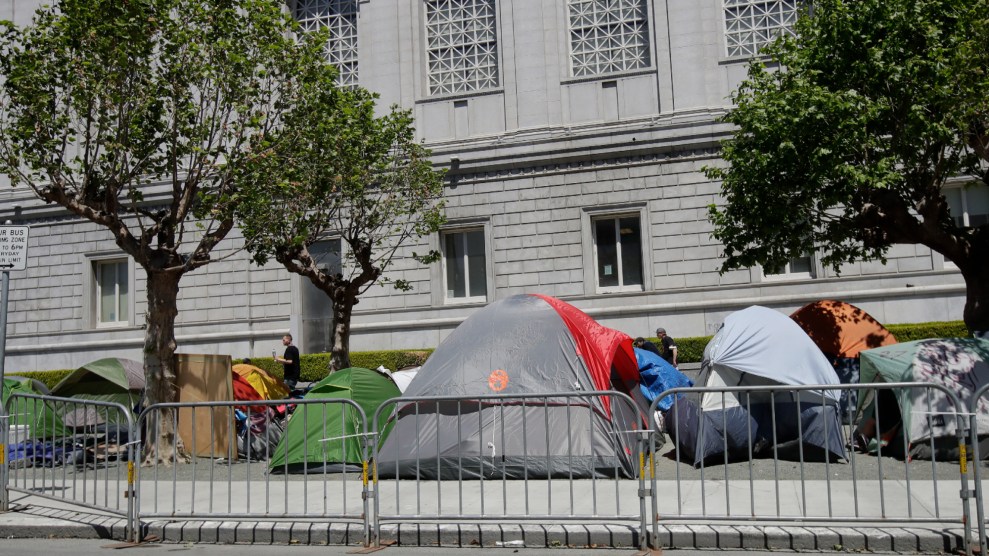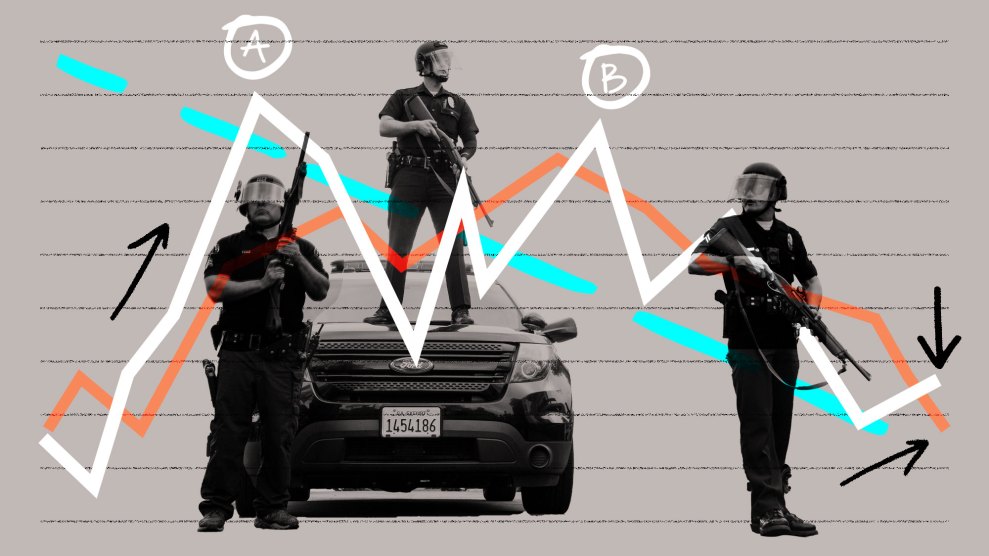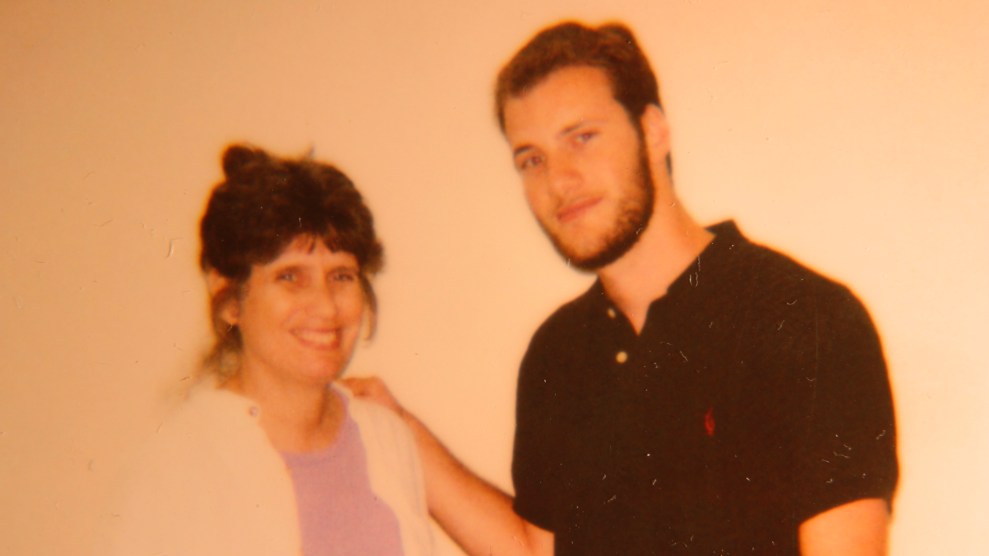
Jeff Chiu/AP
You’ve heard it on Fox News. No, in the New York Times. Wait, actually that was the Wall Street Journal. Or was it the Bay Area ABC News affiliate? One thing much of the media can agree on these days is that crime is rampant in San Francisco. But, wait, is it?
The liberal bastion has been painted as a city-under-siege. It has taken center stage in the country’s nationwide debate about criminal justice policy, as District Attorney Chesa Boudin—elected in 2019 on a mandate of curbing mass incarceration—faces a second attempt to recall him from office. The narrative promoted by Boudin’s opponents is that his approach, doing things like ending cash bail, and focusing on expanding diversion programs, incentivizes would-be criminals, and is characteristic of a broader failure of progressive governance that has turned big liberal cities into lawless wastelands. A Substack devoted to adversarial coverage of Boudin (launched through the crowd-funding efforts of a rich tech guy), calls itself, predictably, Gotham.
But the real picture is complicated. Earlier this month, Peter Calloway, a San Francisco deputy public defender and a resident of the Tenderloin neighborhood (where earlier this year, citing drug overdoses, Mayor London Breed declared a state of emergency) went viral for a twitter thread that showed just how little basis the narrative has in reality. A week later, the San Francisco Chronicle backed Calloway up with even more statistics, writing: “The data shows that crime shifted dramatically during the pandemic. But now that San Francisco is returning to pre-pandemic behavior, so are its crime rates.” It’s worth noting that cities with more old-school law-and-order prosecutors—including Sacramento, where District Attorney Anne Marie Schubert, who is running for state attorney general on a more lock them up approach, governs—aren’t safe havens. In 2020, eight out of ten of the states with the highest murder rates were controlled by Republicans.
So, if “crime” is up everywhere, and even those upticks were overstated, why are Boudin and other criminal justice reformers facing such intense opposition?
THREAD: There’s a lot of talk right now about crime in San Francisco. Almost everything you’ll read in the mainstream press is wrong. I live in the Tenderloin and work in the courts every day. Here’s my take on what’s happening and why.
— Peter Calloway (@petercalloway) April 1, 2022
Last week, I called Calloway—who joined the SFPD office in 2018—to talk about what criminal justice reform advocates should expect out of progressive prosecutors, the national implications of the Boudin recall, and how the media are part of hyping a “crime surge.”
This interview has been condensed and edited for clarity.
Let’s start with the the basics from your thread. There’s a narrative that has developed that San Francisco is unsafe and that policies attempting to reform the criminal justice system are to blame. Can you talk about why this narrative is wrong?
The narrative is wrong because it’s empirically wrong.
So, the narrative is San Francisco is a very violent place. It’s a disgusting, filthy place. It’s a place where anything goes. It’s a place where the police don’t even bother making arrests because they know that the the District Attorney Chesa Boudin won’t prosecute. When there is a prosecution, nobody’s facing any meaningful consequences. You can’t walk around without being attacked.
There’s the full blown Fox News version, where San Francisco is basically a war zone. And there’s the San Francisco centrist version, which usually points to crisis levels of homelessness and drug use—particularly overdoses—that do exist and it couches tough on crime solutions in the language of care and empathy.
The reality is the numbers just don’t bear out either version of the city. The catalyst for the thread was this article on the Tenderloin in the Washington Post that referred to a jump in certain categories of crime as double digit percentage increases.
Murder and rape are up double-digit percentages since last year! Well, he’s right about that. And it sounds scary. But what are the actual increases (# of incidents, not %)? Homicides increased from 10 to 11. Rapes increased from 22 to 28. https://t.co/uomhDaMBGP
— Peter Calloway (@petercalloway) April 1, 2022
So, I looked at the actual numbers using the San Francisco Police Department’s publicly available data, and saw that these double digit percentage increases were actually single digit incident increases. The number of homicides went from 10 to 11, which is a 10% increase. And the number of rapes went from 22 to 29. But violent crime is lower than it was in 2018. It’s significantly lower than it was in the 80s and 90s. Since 2019, crime across the entire city has decreased, and crime in the Tenderloin has decreased overall.
Over the same period, rape, robbery, and assault *decreased* by 47% (-191), 27% (-851), and 6% (-160). So, violent crime (which the SFPD categorizes as homicide, rape, robbery, and assault) decreased by 19% (-1187). Property crime over that period is down by 11% (-6083).
— Peter Calloway (@petercalloway) April 1, 2022
Larceny (petty theft and grand theft)—which was heavily relied upon by the board and the mayor to justify their draconian anti-poor policing strategies—was down 6.84% (-173).
— Peter Calloway (@petercalloway) April 1, 2022
You mention in your thread you’re also resident of San Francisco that lives in the Tenderloin, can you talk about what that’s like?
I’ve lived in this neighborhood since I moved to the city, a little over four years. One thing that I find frustrating is that I know there are doubtlessly people who believe this narrative because of what they’re told and what they’re reading. They have a good faith belief in the solutions that they’re advocating for, because they’re told that those solutions work. I don’t have an issue with those people. But it’s frustrating because it’s a consequence of a deliberate or reckless sort of disinformation by some politicians and the media. It’s extremely frustrating to hear people feign empathy for people who are suffering in this neighborhood and advocate for things that we know don’t work, like more police and more arrests of drug dealers. We know that those are not the solutions to these problems. This is drug war 101 stuff. No credible person who has studied the drug war and its implementation and execution in any city across the United States could advocate for a drug war policy with a straight face.
Living in this neighborhood, I see a lot of suffering. Every day I usually walk to work, and so I pass people who are really down and out. I see a lot of drug use. In many areas, the sidewalks are pretty filthy. I see people treating serious wounds just sitting on the ground. It’s frustrating we have not successfully implemented meaningful policy solutions to these problems.
In criminal justice reform debates, there’s often a dichotomy set up between “solving root causes” and “feeling safe right now.” In your thread you say, “politicians love to say that even despite the numbers, the way people feel about crime matters….but rarely mentioned is the way we feel about crime is a direct consequence of how media and politicians talk about it.” So, how can the media cover this better?
I cast a wide net in my claims in the thread. There’s a lot of really great journalists out there doing really important work and there are good journalists in the city as well, including at major publications. But even good journalists can make mistakes, and those mistakes can be pretty consequential.
For example, choosing to amplify sensational incidents, like shoplifting videos in San Francisco. Choosing to cover that without meaningful scrutiny shaped the way people perceive crime in the city. One of the members of the Board of Supervisors held a hearing on retail theft in San Francisco. And he had a number of executives from Walgreens, Safeway, and CVS give long presentations on the impact that has had on their businesses. It was all couched in this story that these are organized criminals from out of city and out of county preying on San Francisco. As a consequence of their predatory behavior, we’re having to shut down locations, and that makes it harder for people in these neighborhoods to get the medicine that they might need. In the worst cases, somebody with real mobility issues suddenly can’t get the medication they need. That could have tremendous consequences.
It was later uncovered by The Appeal (and media critic Adam Johnson) and then reported on by local press, that at least one of these organizations had, as part of a business plan related to downsizing to increase profits, already planned to shut down all these stores. So they’re using this theft problem to cover up the harm they know they’re doing to community members for the purpose of boosting their bottom line. Uncritical coverage of the supervisors hearing enables that narrative.
You said in the thread that the perception of crime in San Francisco is being exploited so people don’t have to “grapple with the conditions that the recall proponents helped create.” For the rich power-players funding the recall campaign, what do they gain in seeing someone like Chesa Boudin recalled?
Well, there are different categories of recall supporter. But some of these people have explicit stakes in the outcome. One of the billionaire recall proponents was an early funder in DoorDash, who Chesa Boudin is suing for misclassifying its employees as contract workers. He’s challenging financial interests in the city in a way that makes them unhappy and uncomfortable. This is something that is not typical for a district attorney. They’re supposed to be weaponized against the poor, not the wealthy. He uses his office’s power in ways that are well within the mandate, but not what the sort of wealthy elites in this city expect. I think that explains some large chunk of the support of the right-wing billionaires and other wealthy supporters of the recall campaign.
What are those conditions? The literature is clear: Lack of access to affordable housing and good jobs, the absence of robust mental health care, wage theft (which dwarfs in dollar value all property crime across all categories), and other poverty-producing mechanisms.
— Peter Calloway (@petercalloway) April 1, 2022
The other set of supporters is among people who misunderstand the connection between the district attorney and crime in the city. First, they misunderstand the extent of crime in the city. They think it’s going up. They think if they go out too late they’re going to be attacked. They think they have to stay out of the Tenderloin. And that’s not borne out by the numbers. This is actually a very safe city. It has one of the lowest murder rates among cities of its size. So, that’s one sort of flawed premise in their position.
The other flawed premise is that by electing a new district attorney, those things—which again are not as bad as they think they are—will change. And there’s no evidence I’m aware of that the district attorney has an effect on crime. There was a study that found no effect one way or the other.
People have been made to believe that Chesa is a radical who wants to see the system crumble. It’s a ridiculous proposition. It’s empirically shown to be false. His charging rates in some categories are higher even than his predecessor. Some categories, they’re a bit lower. Many categories, they’re roughly similar. Nothing he’s done is really that unusual. I don’t want to diminish what I think are his real achievements in helping to reduce suffering in this city. Declining to prosecute kids as adults, for example. Not using various sort of status enhancements for crime, like when somebody is alleged to have to be in a gang and as a consequence, they’re sentenced to a number of additional years in prison.
Is it possible that supporters of progressive prosecutors overstate what is possible to accomplish within that office, and then opponents of progressive prosecutors greatly distort how much of an effect they have on crime? I’m wondering what should be reasonably expected out of prosecutors who want to use that office to make reforms.
I think one of the more exciting opportunities that the progressive prosecutor movement presents is narrative building work. I mean, you’ve got somebody who is now the chief law enforcement officer in a given jurisdiction, who can have conversations with people about crime, about harm, about accountability, and who can explain to people that more police are not going to make you safer. In San Francisco, we have more police per capita than any other city in the state with a population over 100,000 people. There’s some disagreement among some experts, but I don’t think there’s really credible evidence to show that police reduce crime. There’s evidence that they don’t in the long term. So, that’s one really useful aspect of the role.
I think of it mostly as harm mitigation. We know that incarceration is criminogenic. Reform is something that’s less harmful to an individual, and also better for society over the long term. By simply reducing the time that they spent in prison, it makes it less likely that a person is going to commit a crime down the line. There’s a study that every year that a person spends in prison their life expectancy reduces by two years; because of how serious our mass incarceration crisis is, that actually reduced the overall life expectancy in the United States by two years. I was honestly shocked to read that.
I think it’s important to recognize the potential power of a movement to elect progressive prosecutors, less punitive prosecutors, but also its limitations. And not to be delusional about the likely outcomes and expect that this is going to really meaningfully change the core issues.
When there is a moment of a rise in crime, I’ve noticed that people who support more traditional approaches don’t have to show their work, and they’re not given the same level of scrutiny as someone like Boudin. An example close by San Francisco is the Sacramento District Attorney Anne Marie Schubert, who just announced a run for California Attorney General. Her approach doesn’t seem to be making making Sacramento any safer, and it doesn’t seem incumbent on her to prove that approach works.
It’s a really insightful point. Part of the reason why someone who’s seen as a progressive district attorney has to show how these policy changes aren’t increasing crime or harm, and a law-and-order type doesn’t have to do the same, is that we’ve lived in a tough on crime culture for a long, long time now. It’s the default. There are studies every so often that show public perception of crime far exceeds the reality. We’ve created a culture where there’s extreme bias toward approaches that are employed by these tough on crime types. But as you said, Schubert is about as tough on crime as it gets, and Sacramento has had more homicides last year than any year since 2006.
Sacramento has an "old school" "law and order" district attorney. She leverages all the "tough on crime" tactics (gang enhancements, three strikes, etc.) She is everything that the recall-Boudin folks seem to want in San Francisco. And yet … /1
— Josh Kalven (@kalven) March 7, 2022
What happens to this narrative if the recall succeeds? How does this affect the future of San Francisco? What are the national implications?
I’m terrified that if the recall is successful it will be an affirmation of this idea that crime is unacceptably high, that we know the solutions to it, and that includes prosecuting more people more harshly, arresting people for using drugs if they won’t accept treatment—that in many cases we can’t even provide to them. We’ll see that become the accepted understanding, and the consequences of that will be severe.
I see a lot of harm, a lot of suffering, and a lot of misery in this job. Frankly, it’s a lot to deal with. The idea that there are people who are either intentionally or thoughtlessly advocating positions that will create more of it is really sad to me.
It’s hard to see this as anything but intentional. It doesn’t take much to scratch the surface on these intersecting subjects. When you do—and if it’s your job to do so, I'd hope you could be bothered—the reality, and the reason for this disinformation, emerge pretty clearly.
— Peter Calloway (@petercalloway) April 1, 2022
And then nationally, it will allow people in other jurisdictions to point to this and say: “Look, I understand the harms of this system. I don’t want people suffering needlessly, but we saw it in San Francisco, we saw what happened when they tried, and it failed. People were unsafe.” And they’ll point to specific instances of really horrific things that have happened to people and they’ll use them to advance what will ultimately be a much more harmful state of affairs for the people in that jurisdiction. I think that’s a really potentially disastrous consequence. This is tied into a narrative around progressivism generally. This will be another arrow in the quiver for conservative politicians to point to San Francisco, show some footage of one of the worst blocks in the Tenderloin, and then point to ostensibly progressive politicians bemoaning the problems of the city and say: Even they agree, progressivism has failed and it’s time for a return to what we know works.
A previous version of this story misstated Peter Calloway’s title.









